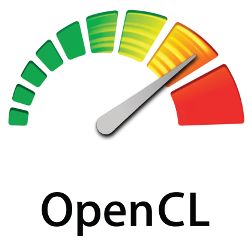Khronos Releases OpenCL 1.2 Specification
The Khronos Group today announced the ratification and public release of the OpenCL 1.2 specification, the latest update to the open, royalty-free standard for cross-platform, parallel programming of modern processors. Released eighteen months after OpenCL 1.1, this new version provides enhanced performance and functionality for parallel programming in a backwards compatible specification that is the result of cooperation by over thirty industry-leading companies. Khronos has updated and expanded its comprehensive OpenCL conformance test suite to ensure that implementations of the new specification provide a complete and reliable platform for cross-platform application development.

OpenCL 1.2 enables significantly enhanced parallel programming flexibility, functionality and performance through many updates and additions including:
- Device partitioning – enabling applications to partition a device into sub-devices to directly control work assignment to particular compute units, reserve a part of the device for use for high priority/latency-sensitive tasks, or effectively use shared hardware resources such as a cache;
- Separate compilation and linking of objects – providing the capabilities and flexibility of traditional compilers enabling the creation of libraries of OpenCL programs for other programs to link to;
- Enhanced image support – including added support for 1D images and 1D & 2D image arrays. Also, the OpenGL sharing extension now enables an OpenCL image to be created from OpenGL 1D textures and 1D & 2D texture arrays;
- Built-in kernels represent the capabilities of specialized or non-programmable hardware and associated firmware, such as video encoder/decoders and digital signal processors, enabling these custom devices to be driven from and integrated closely with the OpenCL framework;
- DX9 Media Surface Sharing – enables efficient sharing between OpenCL and DirectX 9 or DXVA media surfaces;
- DX11 Surface Sharing – for seamless sharing between OpenCL and DirectX 11 surfaces.

Comments are closed.